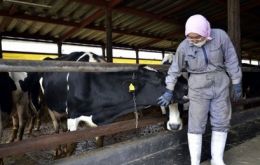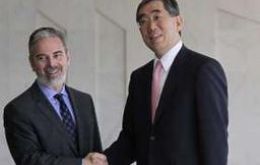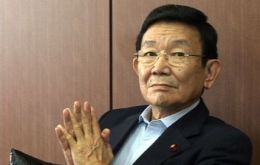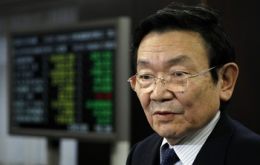MercoPress. South Atlantic News Agency
Tag: Japan
-
Wednesday, July 20th 2011 - 01:47 UTC
Beef scare in Japan: caesium contaminated meats reached consumers

Japan has imposed a ban on all beef coming from the prefecture of Fukushima, where three nuclear reactors melted down following the March 11 magnitude 9.0 earthquake and tsunami. The Japanese government is also apologizing for its delayed response to radioactive meat reaching the market.
-
Friday, July 1st 2011 - 01:48 UTC
Brazil and Japan allege over 100 countries support UN Security Council reform

Foreign Affairs ministers from Brazil and Japan announced that over 100 nations have expressed support for a proposal to expand the United Nations Security Council.
-
Tuesday, June 28th 2011 - 16:26 UTC
Japan interested in closer links with Mercosur attends summit in Paraguay

Japan is attending the Mercosur summit in Paraguay with an eye on proposing the launch of a dialogue to boost bilateral economic relations and explore the possibility of signing a free trade agreement, reports the Japanese news agency Kyodo.
-
Saturday, May 28th 2011 - 07:18 UTC
Tough prospects for Japan: car output down; credit rating lowered and recession

A complicated week for Japan: car production in April plunged as manufacturers continue to face a shortfall in parts supply and credit rating agencies downgraded the outlook on the country’s debt to negative from stable.
-
Thursday, May 19th 2011 - 17:28 UTC
Japan falls into recession following March’s triple blow

Japan's economy shrank much more than expected in the first quarter and slipped into recession after the triple blow of the March earthquake, tsunami and nuclear crisis hit business and consumer spending and tore apart supply chains.
-
Thursday, May 19th 2011 - 17:17 UTC
After shock in Japan force Honda Brazil to cut 400 jobs and halve production

Japanese car maker Honda Motor Co on Wednesday said it will leave redundant 400 workers and halve production at a factory in Brazil beginning next month because of a shortage of parts from earthquake-affected plants in Japan.
-
Monday, May 9th 2011 - 19:12 UTC
Australia submits Japan’s Antarctic whaling program to the International Court

The Australian government filed a written submission at the International Court of Justice in Netherlands calling for an end to Japan's Antarctic whaling program on the grounds that it breaches the international ban on commercial whaling. Australia made the official presentation of its case Monday at the ICJ.
-
Wednesday, May 4th 2011 - 22:49 UTC
Radioactive contamination found in Japanese cars ready to unload in Chile

Last Sunday Chile’s customs agency in the northern Iquique port detained a cargo ship carrying 2,500 Hyundai cars after at least 21 of the cars were found with traces of radioactive contamination.
-
Monday, May 2nd 2011 - 00:42 UTC
Japan’s industrial output plunges record 15.3% and household spending 8.5%

Japan's industrial output fell a record 15.3% in March from the previous month, while household spending tumbled the government announced Thursday, direct result of the earthquake impact and ongoing nuclear crisis.
-
Thursday, April 28th 2011 - 01:39 UTC
Japan credit rating threatened by weak government and lack of political agreement

Risk rating agency Standard and Poor's threatened to cut Japan's sovereign credit rating again, warning the huge cost of last month's devastating earthquake will hurt already weak public finances unless bickering politicians can agree to raise taxes.
